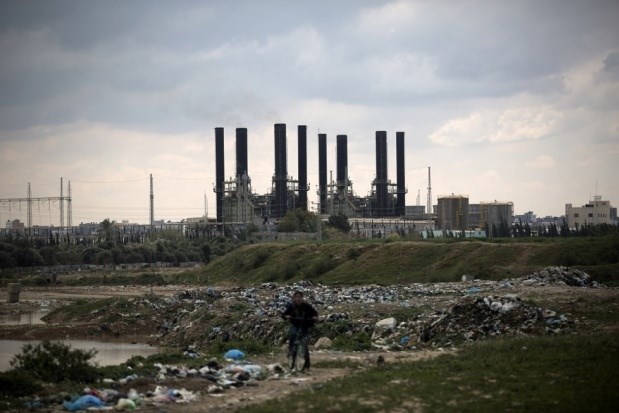Gaza’s months-long power crisis once again took a turn for the worst on Wednesday night, when the besieged territory’s sole power plant shut down, further straining the dire humanitarian situation for Gaza’s two million residents.
Israeli NGO Gisha released a statement on Thursday, stating that the power plant had shut down owing to lack of fuel and that the lives of residents have been “disrupted, entire hospital wards are shut down, untreated sewage is spilling to the sea in heretofore-unseen quantities and beaches are becoming more dangerous for swimming.”
Head of Public Relations for Gaza’s electricity company Muhammad Thabet also released a statement warning of the devastating consequences that would affect every aspect of life in the Gaza Strip if the electricity supply continued to dwindle.
The besieged Gaza Strip only has a supply of 70 megawatts of electricity available, after Israel reduced electricity supply to the besieged territory from 120 megawatts upon request of the Palestinian Authority (PA) three weeks ago, he pointed out.
The import of Egyptian fuel into the territory in recent weeks allowed Gaza’s power plant to resume operations following Israel’s gradual reduction of the impoverished enclave’s electricity supply and temporarily averted a full humanitarean collapse in the territory.
However, the territory is facing a shortage of 600 megawatts, leaving most residents with only two to three hours of electricity per day, followed by 24 hours of blackouts, Thabet said.
Thabet added that the Egyptian lines, feeding the southern Gaza Strip, have been inoperable since last week.
Gisha pointed out that the 70 megawatts currently available to residents in Gaza falls far short of “what would be needed for basic, normal functioning of a 21st century society.”
Generators, which at this point have become vastly overused, are not able to compensate for the power shortages, but are “the only thing keeping Gaza hanging by a thread in the face of a full-on humanitarian disaster,” the group said.
Gisha added that Gaza’s energy crisis is “not the result of a natural disaster,” but has been man-made, a result of cynical political decisions,” and demanded that the PA, Hamas, Egypt, and Israel “end the political games they’re playing at the expense of Gaza’s residents.”
“They must restore maximum power supply and take action toward medium and long-term solutions to meet demand. We stress once more that Israel, given its ongoing control over the Gaza Strip, has a responsibility to enable normal life in Gaza,” Gisha stated.
On Thursday, envoys from the Russian Federation, the United States, and European Union of the Middle East Quartet met in Jerusalem where the leaders expressed “serious concern over the worsening humanitarian situation in Gaza” and discussed ways to resolve the longstanding crisis, originating from Israel’s decade-long siege on the territory.
Human rights groups and the United Nations have also continued to express their grave concern over the worsening crisis in Gaza.
“Families are struggling to safely store and prepare food without refrigeration — a recipe for disaster when combined with the weakened health services. Cooking, heating, and lighting, and other fundamentals of the right to housing are jeopardized. People with disabilities, older people, and women are being hit especially hard,” the United Nations Human Rights Office of the High Commissioner said in a statement Wednesday
“The agricultural sector is also suffering severely limited irrigation, which will worsen widespread food insecurity if the situation continues,” experts cited in the report noted.
“Many operating rooms have now been shut down, basic health services have been drastically cut and complex diagnostic equipment and interventions are available only intermittently,” they said.
The Palestinian Center for Human Rights (PCHR) also released a statement Monday, following up on the decrease in medical referrals for treatment abroad being issued by the PA Health Ministry, which came without explanation and amid a healthcare crisis that has been compounded by life-saving equipment being made inoperable due to the electricity shortages.
Data collected by PCHR showed medical referrals issued for the Gaza Strip patients reached 2,190 referrals in March, declining to 1,756 in April at a rate of 19.8 percent, to 1,484 at a rate of 32.2 percent, and to a paltry 500 in June at a rate of over 75 percent.
According to the statement, of over 2,500 patients suffering from serious diseases who have already been approved by the Higher Medical Committee in June for treatment abroad, just 400 have been approved for financial coverage.
The statement warned that “a number of these patients were admitted to the intensive care unit in Gaza following their health status deterioration,” and that “hundreds of patients have been expecting death in the Gaza Strip hospitals in light of the absence of any opportunity to receive treatment abroad.”
[Source: Maan News Agency]





 WhatsApp us
WhatsApp us 

